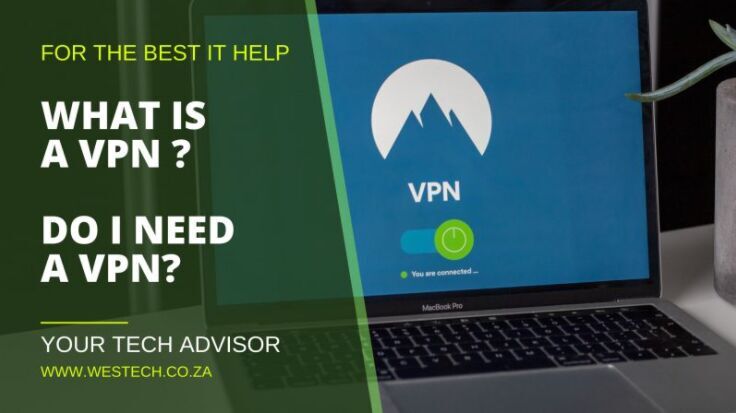
Sandton, December, 17, 2021 - Perhaps you have heard of a VPN but, not being an IT Technician, you have no idea of what it is or how it can benefit you. Westech, a preferred IT support and services partner in South Africa, recently launched its own FAQ site to address some of these issues that perplex non-technical users of computers and laptops.
What Does VPN Stand for?A VPN, which stands for Virtual Private Network, is a system that provides you with a safe and secure connection over the internet to link you to your network, files, and applications, as well as to safely transmit data.
What Does a VPN do?VPNs provide a level of encryption that disguises your online activity in real-time, making it difficult for third parties to track you or to steal your data. Furthermore, not even a computer can decipher the code during the most vigorous hacking attempt without the encryption key.
Servers proving VPNs are usually located in foreign countries, so even your physical location cannot be determined. In addition, most VPNs do not keep activity logs which means that your online behaviour also remains hidden.
Are There any Drawbacks to Using a VPN?Unfortunately, the answer is yes. Certain services and website content may not be accessible from everywhere. This means that you may not have access to certain content in your home country or if you are travelling abroad. Some VPN services provide location spoofing where you can switch to a server in another country. However, this is not always successful.
Should you use a VPN Service?While your Internet Service Provider (ISP) will usually set up your connection to the internet, they can also fall victim to cyber-attacks or even share your browsing history with advertisers. In short, you never know who is monitoring your internet usage. As a result, you may want to consider opting for a VPN service to protect your data from being compromised online.
How to use a VPNUsing a VPN service will ensure that not even your ISP can recognise your location or browsing habits. Only your computer and the VPN will know the encryption key. Once you are online, you can activate your VPN and change your IP address. This will allow you to safely surf the internet while your data, surfing behaviour and location are protected.
Are There Different VPNs?Although there are many different types, you should be aware of the three main ones; SSL VPN, Site to Site VPN and Client to Server VPN.
- SSL VPNs are generally used by companies to prevent pirated devices from using their private network.
- Site to Site VPNs are also used primarily by large companies but are very complex and less versatile than SSL VPN’s.
- Client to Server VPNs are becoming more popular with companies and individual users alike.
If you are interested in installing a VPN on your network, it is essential to be aware of the different types of implementations. For further information and advice tailored to your specific requirements, please contact a Westech IT Technician.
Get new press articles by email
The Write Content Co writes interesting and relevant content on a variety of topics for many industries. This search engine optimised (SEO) content is used in corporate blogs, newsletters and websites. In addition, the company offers proofreading and editing services for existing content and promotes its clients' articles through concisely written press releases.
Latest from
- IT Trends in 2022
- What Does it Take for a Business to Become Successful and Significant?
- Choosing Between a Virtual or Physical Computer
- Questions Models Should Ask Potential Agencies
- Face to Face Learning in a World of Sport and Fitness Training
- The Versatility of Aluminium Venetian Blinds
- How Easy is Bamboo Flooring to Maintain?
- The Benefits of Using the Cloud for Personal Use
- My Email is not Working. What Should I do?
- Modelling – The Secret to a Great Posture
- Can Your Hyper-Anxiety Lead to Depression?
- Are you Considering a Career in Sport Management?
- What Every Beginner Gamer Should Know
- Mitigating Cloud-Based Attacks - MS Azure Narrowly Avoided Becoming a Statistic
- Westech's New FAQ Page Addresses Some Common IT Concerns
The Pulse Latest Articles
- Education Is The Frontline Of Inequality, Business Must Show Up (December 11, 2025)
- When The Purple Profile Pictures Fade, The Real Work Begins (December 11, 2025)
- Dear Santa, Please Skip The Socks This Year (December 10, 2025)
- Brandtech+ Has 100 Global Creative Roles For South African Talent (December 9, 2025)
- The Woman Behind Bertie: Michelle’s Journey To Cape Town’s Beloved Mobile Café (December 9, 2025)
